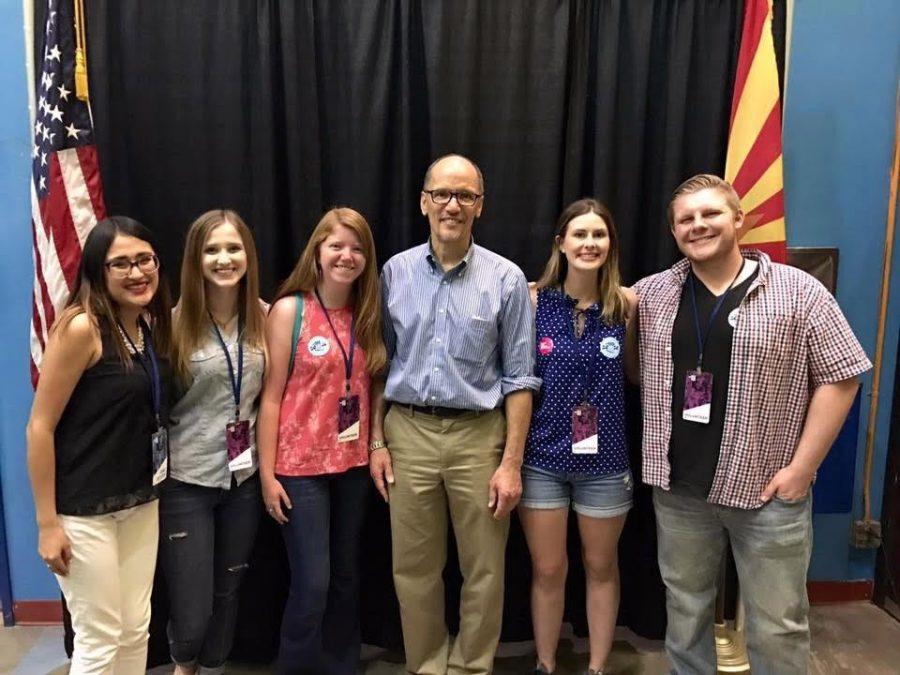Whether you support or oppose President Trump, there is no argument over the fact that he incites a willingness to participate in the conversation of today’s political issues. As he is an unapologetically outspoken politician, students of all backgrounds and political preferences have been inspired by President Trump’s actions to leave any previous state of neutrality behind and speak up about their personal interests in our democratic society.
Millennials have made it a priority to be a passionate, driven and progressive generation. In a 2015 study conducted by the Higher Education Research Institute at UCLA, 141,189 people at 199 U.S. universities, representing the United States’ full-time college freshman students, completed a survey for researchers to form conclusions about this age group’s general viewpoints towards politics.
The research showed that 59.8 percent of freshman students expected to vote in an election during college, and 40 percent said that keeping up-to-date on political affairs is “very important” or “essential.”
Out of this sample, 33.5 percent identified themselves as “liberal” or “far left” and 21.6 percent identified as “conservative” or “far right.” When comparing these numbers to previous years’ data, it has shown that not only is voter turnout increasing, but more young adults are connecting with a particular political viewpoint.
Shanna Nelson, a member of the state board for the College Republicans and a sophomore majoring in philosophy, politics, economics and law and German studies, said the organization has seen a big increase in political involvement on campus, as well as in the state as a whole.
“Membership has increased and more students are getting involved in the political process,” Nelson said. “College Republicans generally have a hard time with colleges being so liberal and they find it difficult to have a voice on campus. The election provided a platform for conservative students to be heard and express their views positively.”
Daniel Pressman, the president of the UA Young Democrats and a junior majoring in political science and Judaic studies, said he’s seen an increase in students and community members coming to rallies, such as the Women’s March.
“Our Facebook page has reached more people and our membership has gone up a little, but we have seen some discouragement among students based on the election results,” Pressman said.
RELATED: UA’s Young Democrats elect Daniel Pressman for club president
This trend of increasing political activism among college students is reconfirmed time and time again. Records were broken during the UCLA study, reporting that 8.5 percent of freshman students said there was a “very good chance” that they would participate in a protest during college, 39.8 percent said it was “very important” or “essential” to become leaders in their community and 59.2 percent expressed it was “very important” or “essential” to improve their knowledge of other cultures.
The data shows that minority groups have placed importance on promoting racial understanding and influencing social values, 52.7 percent of Latino students and 63.8 percent of African American students.
This trend has only expanded since President Trump’s recent travel ban, which was received with harsh criticisms over its unfair prejudices towards certain racial and religious groups.
Erica Cook, a sophomore majoring in anthropology, has been interested in politics since high school.
She said she has noticed that many students on campus are getting more involved in politics because of the recent elections, especially because they sometimes feel like they don’t have a say.
“I think that people are going to start to realize how democracy works and that subsidiarity is the way,” Cook said.
Through the use of social media, movements such as #NotMyPresident and the Women’s March on Washington have grown to astonishing numbers.
These types of movements are in direct response to President Trump’s revocation of federal transgender bathrooms guidelines in schools, his attitude toward women, etc.
In the Journal of Media Literacy Education’s 2016 study of “Political Engagement During a Presidential Election Year,” a 20-question online survey was distributed to about 200 college students in media literacy courses. The research suggests that news coverage through social media plays an important role in the decision of voters.
The study investigated how these students were getting their information about the presidential candidates and 95 percent of the sample said they used social media platforms such as Facebook and Twitter to track a large amount of their news.
RELATED: UA student John Dalton elected Pima County Republicans treasurer
Also, a majority in the study claimed to take action in their communities primarily through the use of social media networking. These actions included writing or signing a petition, starting or joining a Facebook group for a particular political cause, encouraging others to vote, displaying a political sticker or sign and or contacting an elected representative at various levels of government.
In a Pew Research Center survey, new trends were discovered regarding this generation’s popular opinion, one being that “millennials have fewer attachments to traditional political and religious institutions, but they connect to personalized networks of friends, colleagues and affinity groups through social and digital media.”
In the midst of a disconnection between the government and the public, a spirited generation with rising voices will put President Trump to the ultimate test in search for a satisfying balance of policies for all Americans to live by.
Follow Kathleen Kunz on Twitter









